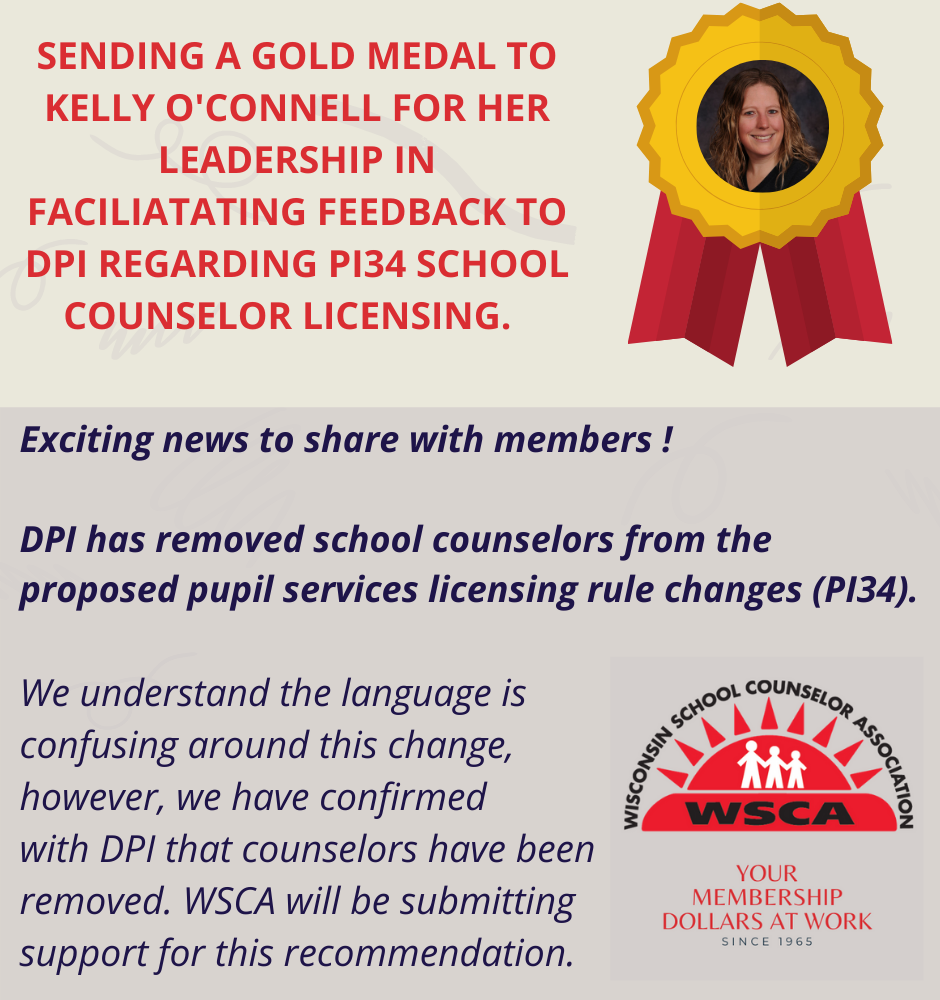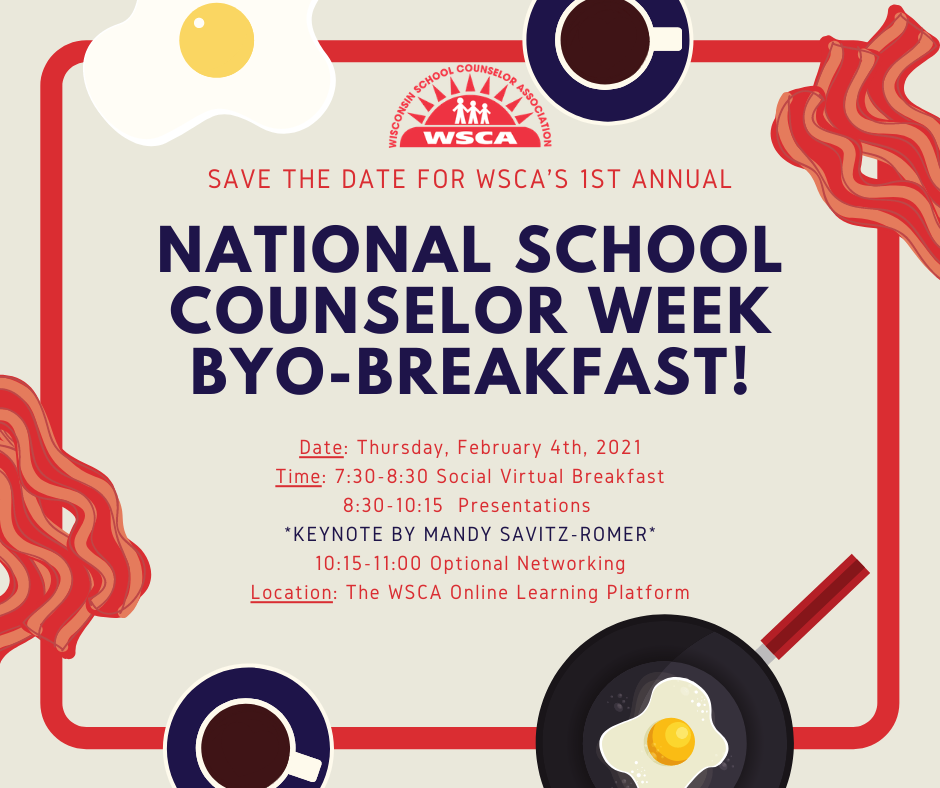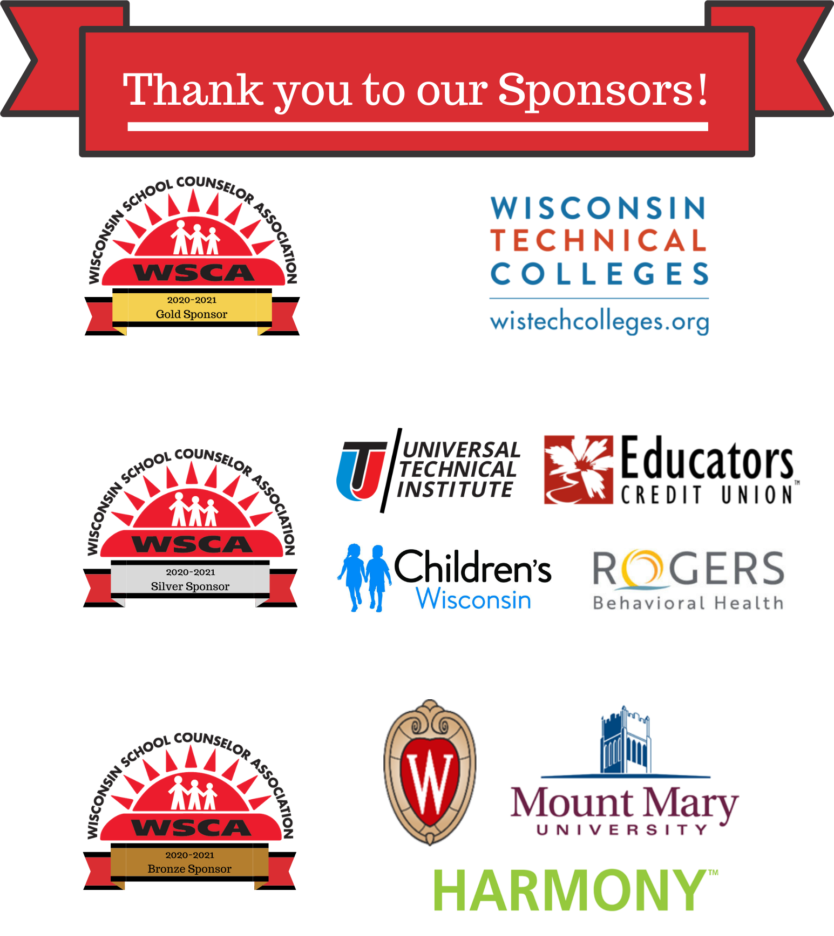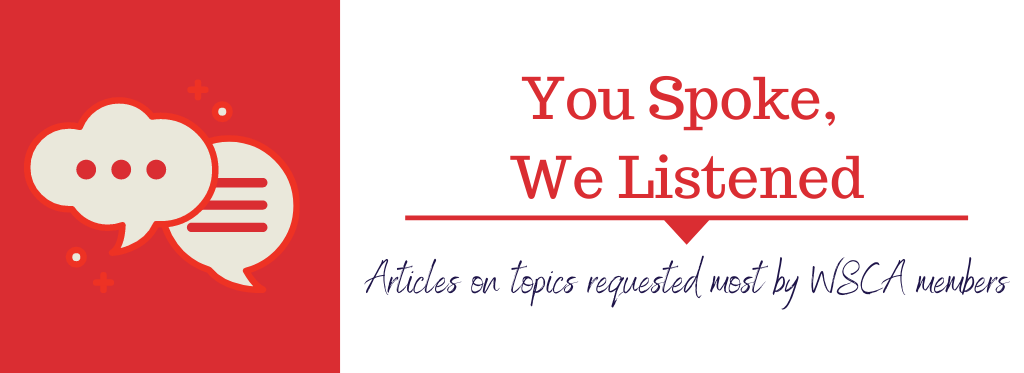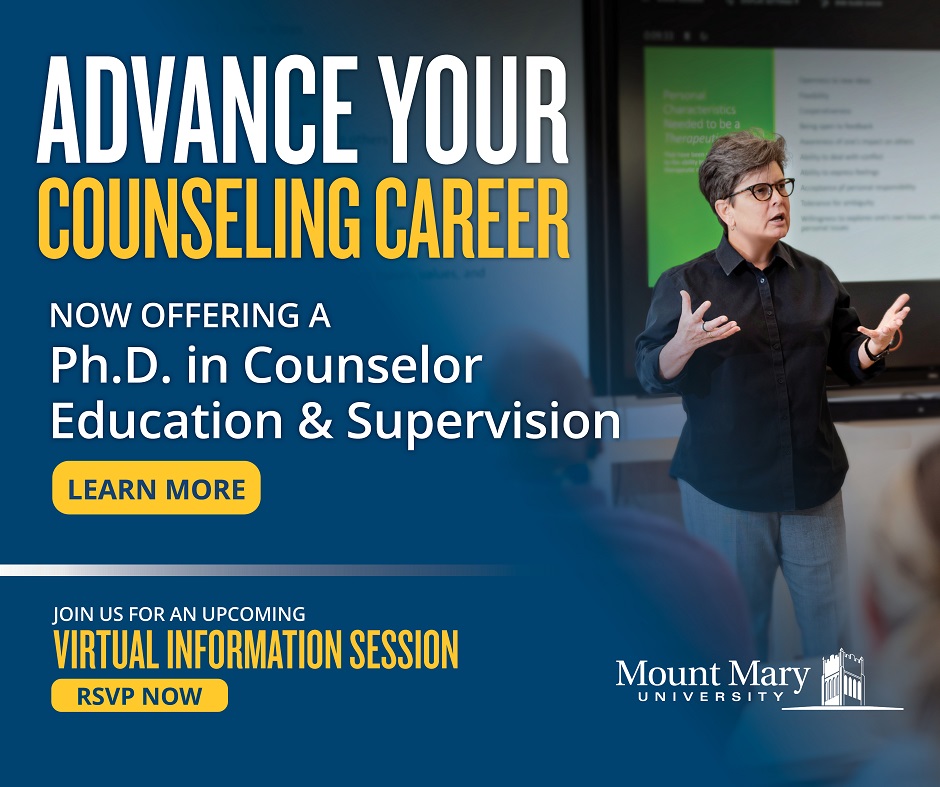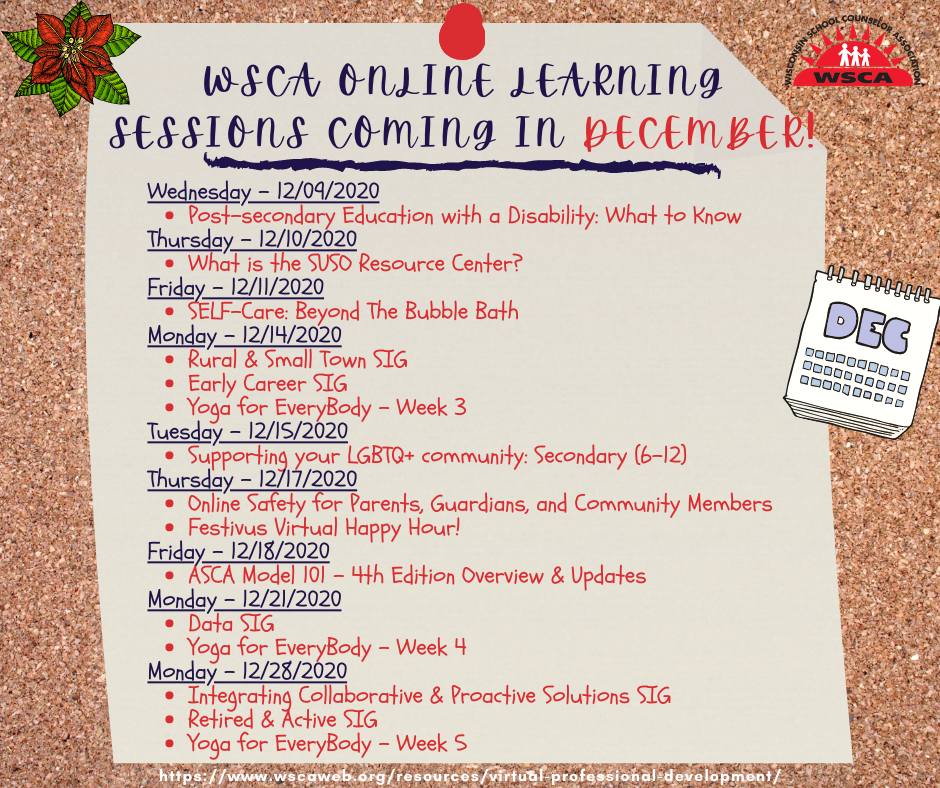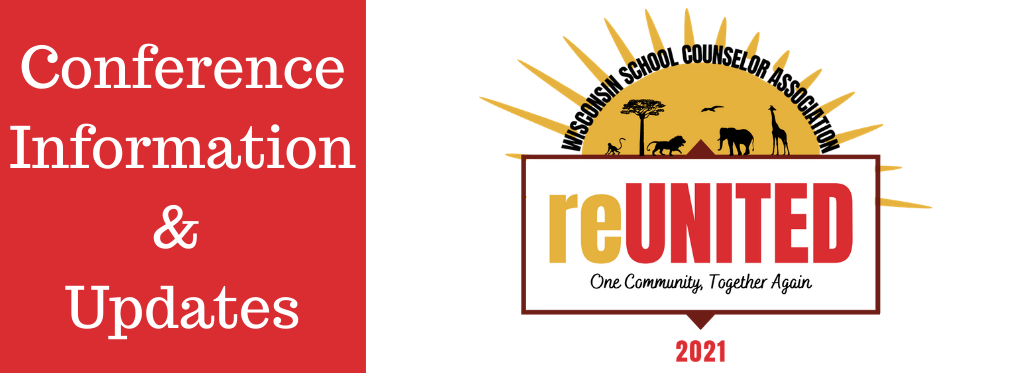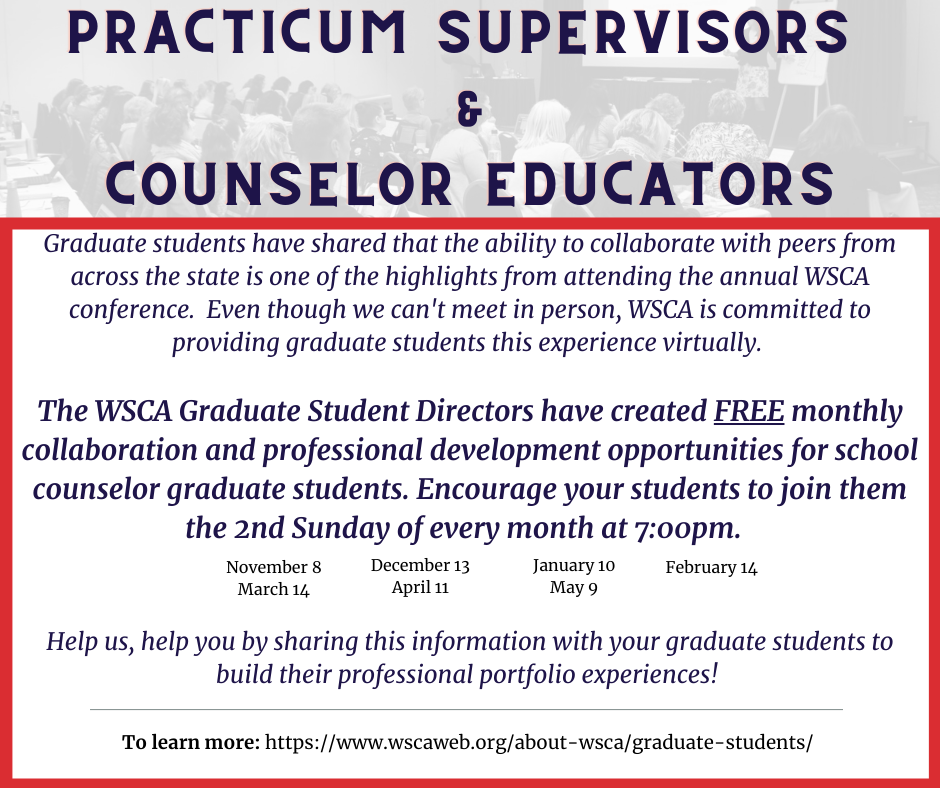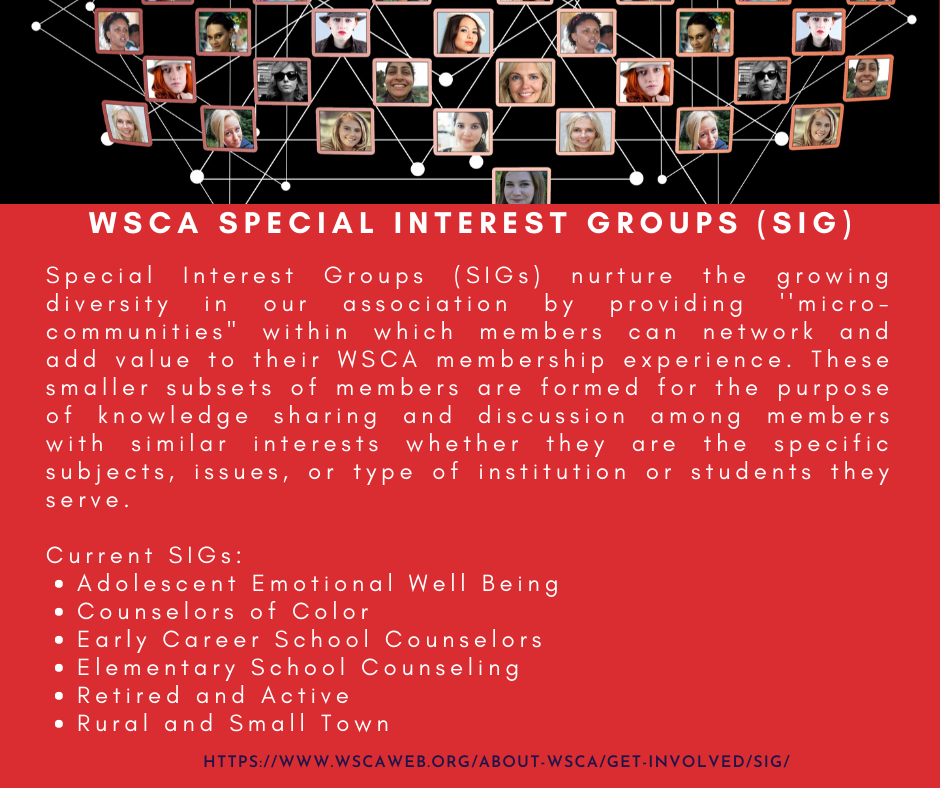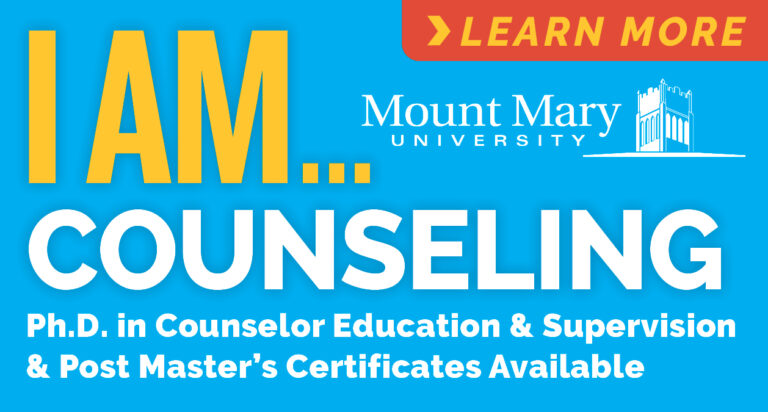December 2020

In This Issue:
- A Message from the Executive Director
- A Message from the Board of Directors
- Board of Directors Position Application & Invitation Video
- Thank you to our Sponsors!
- Feature Article – Achieving Results Following the ASCA Model
- You Spoke, We Listened – Social-Emotional Well-Being: Supporting Students with School Anxiety During COVID-19
- Equity & Social Justice: MATC’s Robust Suite of Student Services Makes Path To Success More Attainable
- College & Career Readiness: Integrating Employability Skills: A Framework for All Educators
- Legislative Update – DPI has removed school counselors from the proposed pupil services licensing rule changes (PI34)
- Online Learning – December Upcoming Sessions
- Conference Information & Updates – Call for Preconference & Conference Proposals for November 2021
- Upcoming Events & Committee Updates – Save the Date for our NSCW Event!
- Scholarships Closing Soon!
- Graduate Student Free Monthly Collaboration Series
- Special Interest Groups
- WSCA Committees Need YOU!
Stacy Eslick
WSCA Executive Director
Dear WSCA members,
A few things that I know from living in Wisconsin my entire life is that we value local control, being nice, and demonstrating a hard work ethic. We put on a face that everything is “just fine”, nothing is harder for us than for everyone else right now so there is no reason to complain or be upset. As I am talking with counselors from across the state, a common thread emerges that educators and counselors are not “just fine”, local control during a pandemic makes it increasingly difficult for schools and administrators to make decisions that were not an issue in the past, parents are stressed and many students are just getting by. It is ok to not be ok right now. As an association, we are doing everything we can to make things simpler for you. We are trying to find take and go resources that won’t require lots of extra effort on your part to implement. We also encourage you to participate in the opportunities WSCA has created to connect with your counseling colleagues who understand your challenges and can support you to do the best you can right now.
Coping with Stress, Burnout, and Trauma
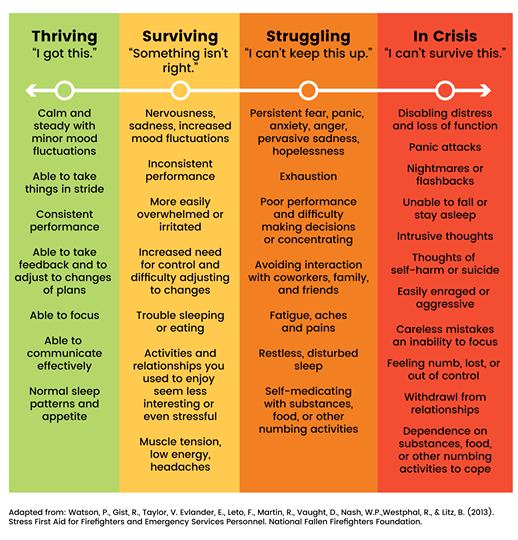
How do we do this?
- Accept that there are events that you cannot control.
- Cultivate a positive attitude.
- Engage in mindfulness practices.
- Learn and practice relaxation strategies.
- Practice assertiveness skills.
- Take care of your body through movement and nutrition.
- Reflect on what brings meaning and joy to your life.
- Develop time and task management skills.
- Get enough rest and sleep.
- Don’t rely on alcohol, drugs, or compulsive behaviors to reduce stress.
- Take a personal day to regroup.
- Set boundaries.
Are you thriving or just surviving? The COVID pandemic has created a concurrent crisis around mental health. We all need to be taking care of each other, but that includes ourselves. This is especially true for healthcare workers. This site from the Colorado Healthcare Ethics Resource Group offers information and resources to help address the anxiety and stress that can, if left unaddressed, deteriorate into crisis. https://cohcwcovidsupport.org/coping-strategies
~Stacy
Steve Schneider, Board Member
School Counselor, Sheboygan, WI
It was the Spring of 2004, and I was finishing my 8th year as a school counselor. Our district team of counselors had contracted with Mark Kuranz to provide us with some PD around the newly published ASCA National Model. It was during one of the sessions with Mark when I started to think about what it could mean to be a leader in school counseling (after all, this new model was fully promoting the concept). After the session, I cornered Mark and started a conversation about my perception (still being pretty young in the profession) that there was very little formal professional development that focused on leadership skills for school counselors. Mark did a great job of listening to me, although I’m pretty sure he was also busy devising an escape plan as well after a long day of training.
After that day, I started to be more intentional about finding leadership opportunities. I quickly contacted my district office to see if there was any way I could find funds to attend the ASCA Conference that summer. Fortunately, there were some accounts with residual funds, and later that summer, I took off for Orlando to attend my first national conference, not knowing a single person who was attending. So, it came as a relief when I saw Mark talking with someone in the hotel lobby. Whew! Someone I knew, AND from Wisconsin! He waved to me, and then the person he was talking to started to walk towards me, clearly coming to talk with me. He introduced himself as Ed Coyle, the President of the Wisconsin School Counselor Association. Ed proceeded to tell me that he was looking for a treasurer for the association, and that Mark informed him that I was looking for leadership opportunities in the profession. Now, Mark took some liberties in his interpretation of our conversation earlier in the Spring, and I’m pretty sure Ed had asked him to be the treasurer and he wasn’t interested, and that coincided with the moment he saw me across the hotel lobby and waved, thinking to himself, “Aha! Steve is my escape plan. I’ll deflect this conversation his way.” And then told Ed he should ask me. This is an uncorroborated account, but I’m pretty sure that’s how it happened.
Now, almost 17 years later, I remain an active advocate for the profession through leadership with WSCA. And I’ve had so many great learning opportunities along the way. First Treasurer, then Professional Development & Education Chair, to SPARC-W (now WSCPAR) Chair, to President, to Conference Chair, to Policy Governance Coach, to my current Director position on the Board. And it all started with that nagging question in my mind, “What does leadership look like in the School Counseling profession?”
Clearly there are many, many ways that leadership can be practiced in our work. Being an effective advocate for students requires leadership. Educating students, parents, staff, administrators, and the community about the impact of our work takes leadership. Talking with state legislators during WSCA’s Day on the Hill about the importance of our role in schools is leadership in action.
I hope that you are finding ways to flex your leadership muscle in your current practice. And if you are feeling the urge for more, I encourage you to actively seek out opportunities. WSCA could be a great place to start. I don’t regret for a second saying, “Sure, I suppose I can do that,” when Mark sent Ed my way to ask me to step into a role that has led to so many more great leadership experiences.
~Steve Schneider
WSCA needs a Board of Directors with diverse perspectives that provides leadership and vision to ensure that it stays relevant for its members. WSCA has a long history of being a great School Counselor Association, benefiting from a tradition of great leadership.
WSCA invites you to apply to be a Board Director! If you are looking for a professional leadership opportunity that will expand your understanding of the impact of the school counseling profession, then we encourage you to submit an application this year.
Please CLICK HERE to access the application for the WSCA Board of Directors. Applications are due by Dec. 18, 2020.
View the video below for a personal invitation to apply for the board from board member Steve Schneider
Achieving Results Following the ASCA Model
Mary Krovoza, Nicole Weinstock, Jessica Ebner, Mike Shomion, Erika Spear, Shari Booth, Lori Neuman
Rice Lake Area School District
Work smarter not harder! We have all heard this phrase many times, heck most of us have probably said it to students. The Rice Lake Area School District School Counselors have recently put this phrase into action. We found ourselves floundering daily in the constant “putting out fires” mode that comes with being a school counselor. Years ago (early 2000’s) several of the Rice Lake School Counselors were trained in the Comprehensive School Counseling Model led by the guru of school counseling, JoAnn Quick. This model was great at the time and we did all the things associated with it. However, times change, students change, society changes and we quickly found ourselves falling back into our old ways and our comprehensive school counseling model was in a binder sitting on a shelf. We needed to make a change!
During the 2018-19 school year the Rice Lake Area school district counseling department had the opportunity to participate in the American School Counseling Association (ASCA) school counseling training facilitated by Stacy Eslick, Executive Director of WSCA. This is a five day training spread over two years with the goal of: implementing comprehensive school counseling programs that create positive outcomes for students throughout the school district. This training became a game changer for our department. Throughout the training our department started to build relationships and work very well together as a team.
The ASCA training assisted us in redirecting our focus. We started with a mission and vision statement for our department and individual schools. We have become data focused with student goals and outcomes. We no longer just do things in our program because that’s how we have always done things in the past or because we think it is what is best. Our curriculum and student groups are data driven and focused. At the beginning of the school year, counselors complete an annual agreement and meet with the building administrator to review. We now calendar all of our time – we have yearly, monthly, weekly and daily calendars to keep us organized. Of course, we all know counselors need to be flexible and some days the calendar gets thrown out the window due to a crisis, but we always come back to what’s on the calendar.
As a result of our work, we have learned to promote ourselves. In the past year, the Rice Lake Area School District School Counselors have presented their program to the Rice Lake Area School Board, were interviewed on a local radio station for National Education Week, were recently asked back to this radio show, and have been asked to present (with another district) at the 2021 WSCA conference. We have gained a tremendous amount of support from our administration and school board. So much so that we were able to hire an additional school counselor at the high school level!
We will continue to work the work of the ASCA model. We know that our world is constantly changing, however the Rice Lake Area School Counseling program is built on the foundation to assess, deliver, define and manage with a great team of counselors who have learned to work together, work smarter, build relationships with students and staff and have a little fun along the way. We highly recommend any counseling department that is floundering to consider the ASCA training.

Supporting Students with School Anxiety During COVID-19
Rogers Behavioral Health
Throughout the many changes to children and teens’ learning environments during the pandemic, some students are adjusting better than others. School counselors may be wondering if some of the things they’re seeing and hearing from students are cause for concern.
“It’s normal and even beneficial for kids to have some level of being anxious about school in general,” says David Jacobi, PhD, lead psychologist, child and adolescent cognitive behavioral therapy (CBT) services at Rogers Behavioral Health. “For example, students tend to perform better on tests when they are somewhat anxious. They have heightened attention, and they are better able to retrieve information from memory.”
However, while some school-related anxiety can be positive, Dr. Jacobi warns that excessive and prolonged anxiety typically indicates a mental health issue. What may typically present as school anxiety or school refusal looks a little different in a virtual learning environment.
Dr. Jacobi shares 10 signs a student could be suffering from an anxiety disorder:
- Excessively checks and reviews schoolwork
- Reworks, erases, rewrites assignments
- Has incomplete assignments or spends excessive time completing assignments
- Seeks excessive reassurance from teachers or parents
- Has trouble concentrating
- Expresses self-doubt and criticism, saying things like “I’m stupid”
- Isolates when online school is over for the day
- Doesn’t get enough sleep or sleeps too much
- Experiences frequent headaches or stomach aches
- Attempts to avoid attending virtual classes
What parents can do
Share concerns with the teacher or school counselor
“If parents notice school-related anxiety they should talk with their child’s teachers or school counselor. Even if school is being done virtually, teachers and counselors are still available to help. Discuss how schoolwork is going, and if it seems appropriate, ask for more time to complete assignments. Asist your child in asking for one-on-one time with a teacher for additional guidance.”
Work with your child
“I’m not advising parents to do the schoolwork for their kids, but they can sit with them and encourage them if they’re having a hard time completing an assignment or studying for a test.” For more strategies and tools, listen to Rogers’ Anxiety in Schools and Understanding School Refusal podcasts and access the downloadable resources.
Remember the basics
“Parents should remember the important basics of adequate sleep, a healthy diet, exercise, and a predictable routine. Family meals are a great time to come together, ask questions, and generally check in on how everyone is doing.”
Rogers can help
Rogers offers specialized, evidence-based treatment for OCD and anxiety for children and teens throughout the country. Call 800-767-4411 for a free, confidential screening or request one online.
Additional Resources:
- Facing Anxiety and Uncertainty in the Classroom (published November 2020) https://www.youtube.com/watch?v=-CUZXdBHpKo&feature=youtu.be
- Helping Students with School Anxiety Podcast Series https://rogersbh.org/student-anxiety?
Worry, fear, meltdowns, inability to concentrate, refusing to go to school. Students’ outward behavior can often indicate an internal struggle with anxiety. And as the most common emotional disorder affecting kids today, anxiety is having an impact on thousands of classrooms nationwide.
But how can you know when students are dealing with anxiety? And what can you do to help?
To help you manage anxiety in your students, Rogers provides a comprehensive set of educational tools, helpful articles, anxiety-reducing exercises, and the new “Anxiety in Schools” podcast. In this six-part series, our expert medical staff share ways you can identify at-risk students, practical tips for addressing anxiety in the classroom, and clues for knowing when it’s time to seek professional help. Listen to the podcast and access a library of additional resources below to help your students.
MATC’s Robust Suite of Student Services Makes Path To Success More Attainable
Wisconsin Technical College System
In addition to providing career-ready education and a more affordable path to a four-year degree, Milwaukee Area Technical College offers a full suite of student services to ensure academic success.
During COVID-19 and the resulting economic crisis, students have been forced to integrate education with their personal lives like never before. While the pandemic was not a choice, MATC gives students options to pursue their education while making every tool accessible to them for their academic success.
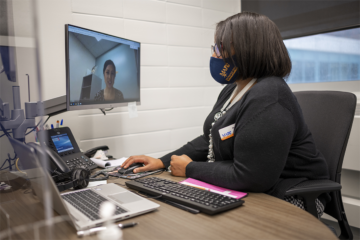
Due to the pandemic, MATC academic pathway advisors have shifted work to reach students virtually.
Advising and Counseling Services
As soon as a student enrolls at MATC, a team of advisors and career counselors stands ready to set them up for success.
Academic pathway advisors are one of their first contacts – and will be present throughout the students’ educational journey.
MATC academic pathway advisors specialize in degree-specific knowledge. These advisors help the student plan their coursework for each semester until graduation.
But there’s more. Students are also served by a pathway retention coach that helps them connect to an abundance of “nonacademic” resources, both on campus and in the community, including support for access to food, housing and transportation. Simply put, retention coaches help keep their students on track.
MATC does not stop with success for students while they are enrolled on campus. The college also provides career counseling to students so that they are prepared for employment opportunities throughout college and after graduation.
Career coaches help students set goals for future employment opportunities, research and identify jobs associated with their educational path and connect students with industry professionals. Learn more about MATC career coaches here.
Tutoring Services
For students who benefit from additional instruction outside the classroom, look no further than MATC’s free tutoring services. MATC tutors are experts in the subject they instruct and versatile in meeting students’ needs.
All in-person tutoring services are structured to follow current Centers for Disease Control and Prevention guidelines; however, students can take advantage of MATC’s tutoring services by phone or virtually. Virtual sessions, called online drop-in tutoring, allow students the flexibility to reach tutors from the comfort of their own homes. Schedules for available tutors are posted online and are continuously updated so that students never miss the opportunity to supplement their learning.
Check out student success stories from the tutoring services on the team’s page. For more information about MATC’s tutoring services, visit the webpage here.
Child Care Services
MATC offers quality, reliable care to the children of students as well as the community. Child care services are offered at MATC’s four campuses and accommodate children 6 weeks to 12 years old, from early morning to late afternoon.
Each on-campus Children’s Center is licensed by the Wisconsin Department of Children and Families to ensure the care is high quality and age appropriate.
Additionally, MATC students benefit from discounted child care services rates, which means quality child care that fits the students’ budgets.
For more information about MATC’s child care services, visit the link here.
Support at MATC doesn’t end with the services mentioned above. Current and prospective students can visit this webpage to learn more about what MATC has to offer.
MATC’s Promise Program
The MATC Promise is Wisconsin’s first free-tuition program for eligible students. Offered to new high school graduates and adults who started but did not finish college, the MATC Promise is unlocking access to college for students who never thought it was possible.
Since MATC launched the Promise programs, we have served more than 1,900 eligible students. To learn more about MATC’s Promise program, visit the webpage here.
Integrating Employability Skills: A Framework for All Educators
Are you looking for resources and materials to support your ACP program development? The federal Department of Education funds the College and Career Readiness and Success Center (CCRS Center) which is dedicated to ensuring all students graduate high school ready for college and career success. The CCRS believes college and career readiness and success for all students is a multifaceted goal requiring the support of states, districts, post-secondary institutions, and the business community. To support this work, the CCRS Center develops products and resources designed to support all stakeholders in implementing their college and career readiness initiatives.
Take a look at these ready to use resources on integrating employability skills. We look forward to continuing to share materials and resources that are ready for you to use. Please reach out to WSCA if you have specific needs in the area of career and post-secondary planning and we will do our best to include this in future WSCAlink publications.
The Great Teachers and Leaders Center, in partnership with the College and Career Readiness and Success Center, developed this Professional Learning Module (PLM) to support regional comprehensive centers, state educational agency staff, and state regional centers in building their knowledge and capacity to integrate and prioritize employability skills at the state and local levels.
This interactive module – a collection PowerPoint slides, handouts, and a facilitator’s guide – provides the following activities:
- Introduces participants to the Employability Skills Framework and explains why it is important for all students
- Connects the Employability Skills Framework with other education initiatives
- Provides strategies to prioritize employability skills at the state, employer, district, and individual teacher levels
- Shows participants how to train teachers to integrate employability skills into lesson plans
Facilitators Guide
https://ccrscenter.org/sites/default/files/EmployabilitySkills_FacilitatorsGuide.pdf
Slides
http://www.ccrscenter.org/sites/default/files/EmployabilitySkills_PPT.pptx
Handouts
https://ccrscenter.org/sites/default/files/EmployabilitySkills_Handouts.pdf
Workbook
https://ccrscenter.org/sites/default/files/EmployabilitySkills_Handouts.pdf
